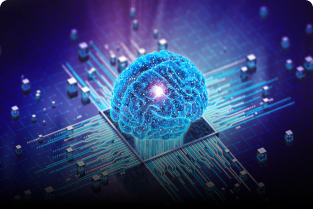Artificial Intelligence (AI) has emerged as a transformative force in the healthcare industry, reshaping how medical professionals diagnose, treat, and manage diseases. From predictive analytics to personalized medicine, AI’s integration into healthcare is revolutionizing patient care and operational efficiency. Here’s an in-depth look at how AI is making a significant impact in healthcare.
1. Diagnostics and Disease Detection
AI algorithms excel in analyzing medical data, including imaging and laboratory results. For example:
- Medical Imaging: AI-powered tools can detect abnormalities in X-rays, MRIs, and CT scans with remarkable accuracy, aiding in early detection of diseases like cancer, stroke, and fractures.
- Pathology: AI systems analyze tissue samples to identify malignancies, often outperforming human pathologists in speed and precision.
2. Personalized Treatment Plans
AI enables the creation of customized treatment plans based on an individual’s genetic profile, medical history, and lifestyle. By leveraging data from precision medicine, AI helps doctors tailor therapies for better outcomes. For instance:
- Oncology: AI systems suggest personalized cancer treatments by analyzing tumor genetics and predicting responses to therapies.
- Chronic Diseases: Machine learning models assist in managing conditions like diabetes by predicting complications and optimizing medication regimens.
3. Predictive Analytics and Risk Assessment
Predictive analytics powered by AI helps identify patients at risk of developing severe conditions, allowing for early intervention. Applications include:
- Hospital Readmissions: AI models predict patients likely to return to the hospital, enabling proactive measures.
- Disease Outbreaks: AI monitors and predicts the spread of infectious diseases, aiding in public health planning.
4. Virtual Health Assistants and Chatbots
AI-driven virtual assistants and chatbots are enhancing patient engagement and support. They provide:
- Symptom Checking: Tools like Babylon Health analyze symptoms and offer potential diagnoses.
- Medication Reminders: Virtual assistants ensure patients adhere to prescribed treatment schedules.
- 24/7 Support: Chatbots offer round-the-clock assistance for non-emergency inquiries.
5. Drug Discovery and Development
AI accelerates drug discovery by analyzing vast datasets to identify potential compounds and predict their efficacy. This reduces the time and cost of bringing new drugs to market. Examples include:
- Clinical Trials: AI helps design efficient trials by identifying suitable participants and predicting outcomes.
- Repurposing Drugs: AI identifies new uses for existing medications, as seen during the COVID-19 pandemic.
6. Robotics in Surgery
AI-powered robotic systems are revolutionizing surgical procedures by providing precision and reducing risks. Notable advancements include:
- Minimally Invasive Surgeries: Robots assist surgeons in performing complex procedures with enhanced dexterity.
- Surgical Training: AI systems simulate surgeries, offering a risk-free environment for training medical professionals.
7. Administrative Efficiency
AI optimizes administrative workflows in healthcare facilities, allowing staff to focus on patient care. Key applications include:
- Medical Coding and Billing: AI automates the coding process, reducing errors and speeding up reimbursements.
- Appointment Scheduling: AI systems manage patient schedules, minimizing wait times and no-shows.
Challenges and Ethical Considerations
While AI holds immense promise, its adoption in healthcare also raises concerns, such as:
- Data Privacy: Ensuring the confidentiality of sensitive medical information.
- Bias in Algorithms: Addressing disparities in AI predictions caused by unrepresentative training data.
- Regulatory Compliance: Navigating complex regulations to ensure patient safety.

